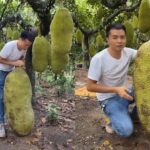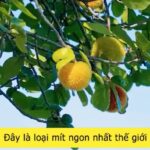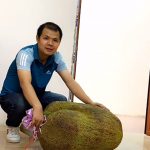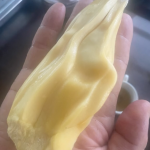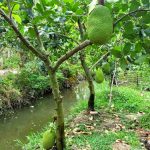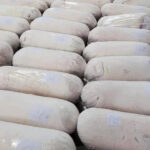Born and raised in a poor rural area, Ly Kim Loi (an ethnic Dao born in 1993 in Thu Cuc commune, Tan Son district, Phu Tho province) never stopped striving to find opportunities to get rich. Although he failed several times, he still decided to bet on the black grape and Korean bunch grape varieties.
With perseverance, a willingness to learn, and the application of scientific and technical advances in production, Loi’s grape garden thrived. Notably, his Korean bunch grape variety has become a specialty favored by many people.
Pointing to his vast, lush, nearly 7,000-square-meter vineyard, Loi said: “About 3,000 square meters are for black grapes, and the rest is for Korean bunch grapes.” Previously, this 7,000-square-meter lush vineyard was barren land that was so depleted of nutrients that almost nothing could grow.
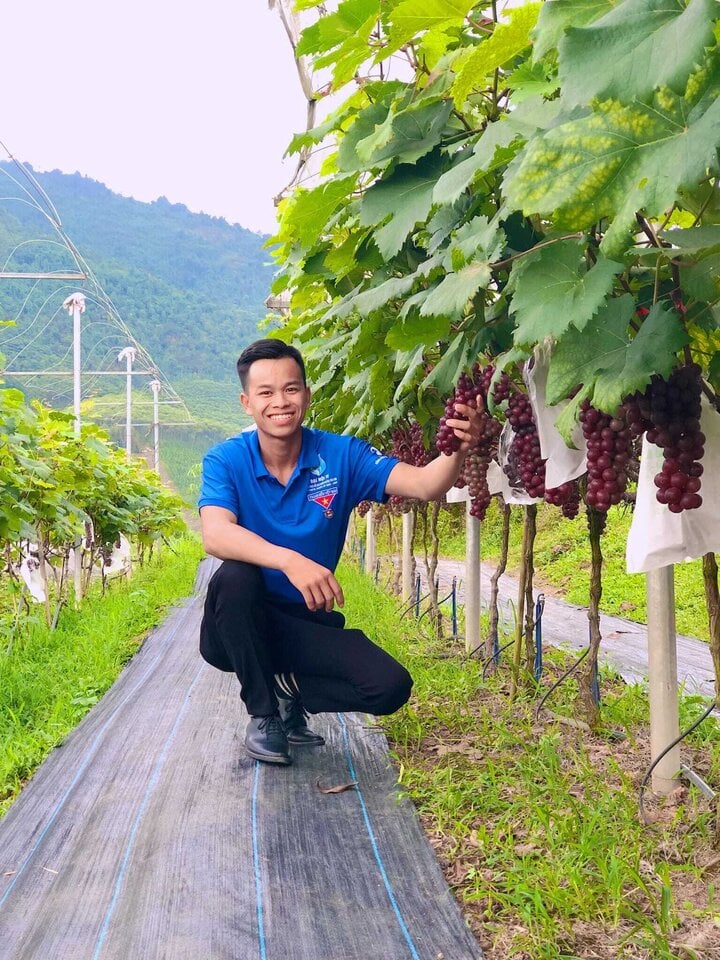
Ly Kim Loi beside the rows of black grapes in his vineyard. (Photo: NVCC)
Loi is an ethnic Dao man with a strong aspiration to get rich through agriculture on his homeland’s soil. In 2011, he began fulfilling his dream by cultivating the red-fleshed jackfruit variety. Soon after, his jackfruit trees bore fruit, coinciding with an abundance of other jackfruit varieties in the North during the season. As a result, despite its uniqueness, red-fleshed jackfruit could not fetch a good price. Moreover, during the winter, the cold weather caused the newly formed fruits to drop.
Determined not to give up but running out of funds, Loi took on various jobs, from fruit trading to construction material sales and driving for hire, to earn money. In 2019, he was captivated by a TV program featuring a black grape cultivation model. Believing that this grape variety could thrive in his homeland, he decided to put everything else on hold and went to the Center for Applied Research and Technology Transfer (Bac Giang University of Agriculture and Forestry) to gain more knowledge and purchase grape seedlings.
Upon his return, he began rehabilitating a 3,000-square-meter plot of land to start growing black grapes. About two years later, the vineyard with 400 black grapevines yielded 1-2 tons per crop. With a selling price of about 130,000 – 150,000 VND/kg, he profited by nearly 80 million VND/crop after deducting all expenses.
This also motivated him to continue rehabilitating the land, expanding the grape-growing area to 7,000 square meters, and switching to a different grape variety, the Korean bunch grape.
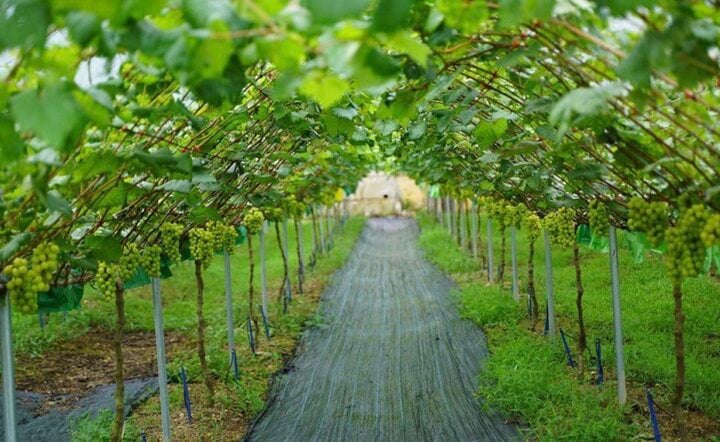
Korean bunch grapes bring greater economic value than black grapes.
“Although black grapes sell well, many people complain about their astringent taste due to their thick skin. So I switched to growing Korean bunch grapes – a variety known as the noble grape, with large, green, juicy, sweet, and milky-fragrant fruits,” he said.
After experimental planting, the grapes grown on the hills of Thu Cuc commune yielded high-quality fruits, comparable to the Korean bunch grapes sold in the market. “This type of grape can fetch millions of VND in the market. If I can grow them successfully with similar quality and sell them for just a few hundred thousand VND per kg, they will surely be in high demand,” Loi said hopefully.
Thus, the Dao youth decided to borrow money and prepare a capital of 400 million VND to start building his Korean bunch grape vineyard. At a cost of about 400,000 VND per grapevine, Loi went to China to import 300 grapevines for planting. About two years later, the vineyard bore juicy fruits, and with the market’s development, customers started visiting the vineyard for eco-tourism.
With a farm-gate price of only 200,000 – 300,000 VND/kg, customers were delighted and satisfied. The Korean bunch grape variety is very robust, well-suited to the climate, and produces abundant, thin-skinned, crisp, and sweet fruits, making it even more popular. “Some customers returned to buy grapes up to 5 times in one season,” Loi happily shared.
Loi’s Korean bunch grape vineyard yields about 1.5 tons per crop, nearly doubling the income from black grapes. Both black and Korean bunch grape varieties, under Loi’s care, yield two crops per year, bringing considerable economic benefits to the ethnic minority man’s family.
“In the future, I plan to continue rehabilitating another 1,000 square meters of land to grow organic Korean bunch grapes, providing clean and safe fruits for consumers in the locality and other provinces,” he shared.
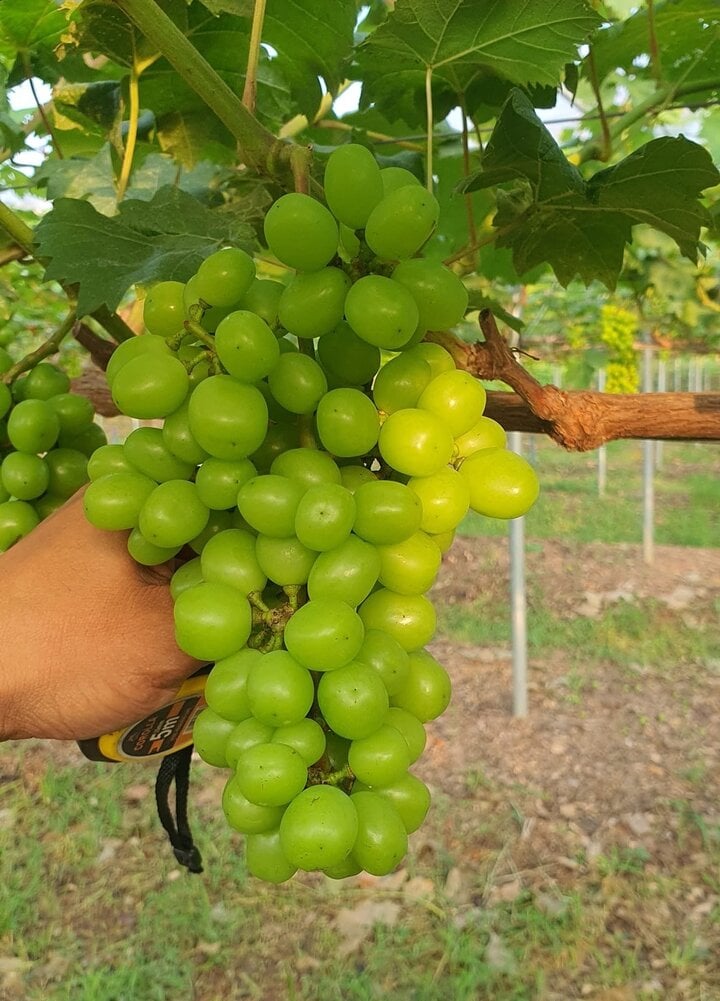
Korean bunch grapes (Korea) in Loi’s vineyard. (Photo: NVCC)
With his impressive successes, Ly Kim Loi has not only changed his life but also become an inspiration for young people who want to start a business and get rich through agriculture.
The Giant Jackfruit: A Surprise Find in Vietnam
The mysterious giant fruits have sparked intrigue, with their unusual size and shape leading many to believe they are mutated jackfruits. Their elongated form and larger-than-average proportions set them apart from their typical counterparts, capturing the fascination of those who stumble upon them.
The Mighty Mit: Unveiling the Secrets Within the Massive 56kg Jackfruit in Lang Son
Previously, a 54.5 kg jackfruit from Hai Duong province wowed everyone with its delicious taste, large segments, and sweet fragrance. Now, all eyes are on the 56 kg jackfruit from Lang Son province, with many wondering if it can surpass the previous record-holder in terms of taste and quality.

